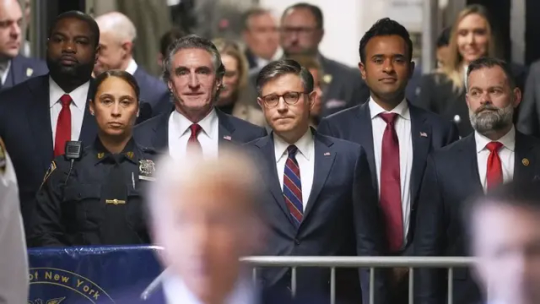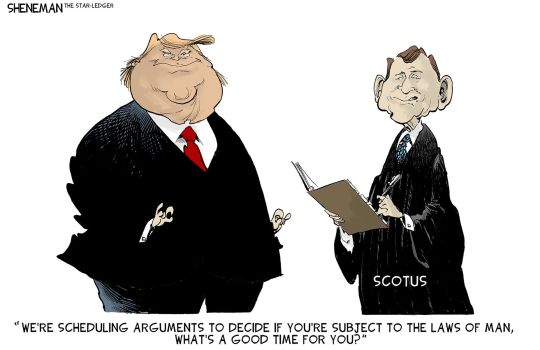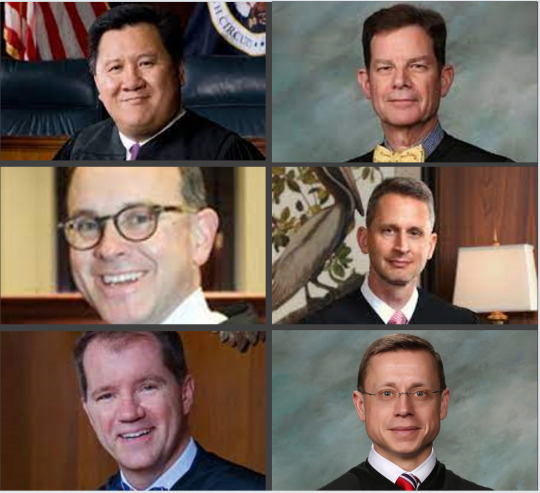#5th circuit
Explore tagged Tumblr posts
Text

Trump sycophants parroting attacks on justice system risk further provoking MAGA extremists
+

+
Defending the Judiciary in 2024
May 17, 2024
ROBERT B. HUBBELL
Events on Thursday highlighted yet another reason Democrats must vote in record numbers in November to defeat MAGA extremism. Republicans are undermining the institution of the judiciary in every way imaginable. Eroding the legitimacy and authority of the courts is textbook fascism. Indeed, in fascist states, courts are co-opted or replaced, becoming instruments of totalitarian rule.
Every American should be concerned about the coordinated assault on the judiciary by MAGA extremists.
It is difficult to identify Thursday’s most egregious attack on the legitimacy of the courts, but it seems appropriate to begin with Justice Samuel Alito.
Justice Alito displays a “Stop the Steal” flag on his front lawn.
As a Supreme Court justice, Alito has been unapologetic in his efforts to defend Trump's lawlessness. He has risen to Trump's defense with gleeful spite and unveiled resentment against those seeking to hold Trump accountable under the Constitution.
On Thursday, the New York Times revealed that Alito’s home displayed an upside-down US flag during the fraught days after the January 6 insurrection. At the time, flying the US flag upside down was a symbol calling to “Stop the Steal” of the 2020 election from Trump. It was a call to insurrection—proudly displayed by a US Supreme Court justice sworn to defend and protect the Constitution. See New York Times, At Justice Alito’s House, a ‘Stop the Steal’ Symbol on Display. (This article is accessible to all.)
In response to an inquiry from the Times, Alito said,
I had no involvement whatsoever in the flying of the flag.
Notably, Alito did not deny the veracity of the photograph of the flag flying upside down on his lawn. He did not deny the symbolism of the upside-down flag. He did not deny that he was aware of its continued presence in front of his house. Instead, he blamed his wife, whom he claimed flew the “Stop the Steal” banner in response to anti-Trump signs in the neighborhood.
Alito’s response to the Times is a lie. He owns the flag. He owns the flagpole. He owns the property on which the flag was displayed. He permitted it to remain on display on his property. He, therefore, did have “involvement” in “flying the flag.” It does not matter that it was his wife who physically raised the “Stop the Steal” banner on the flagpole. Alito’s hair-splitting denial is misleading and incomplete—and therefore false.
All of this leaves us with a second justice on the Supreme Court whose spouse was a booster of the effort to overthrow the Constitution and prevent the peaceful transfer of power.
Those justices—Alito and Thomas—are currently considering Trump's presidential immunity defense to the indictment alleging that Trump attempted to subvert the election. Under any reasonable reading of Code of Conduct that applies to Supreme Court justices, Alito and Thomas should have recused themselves long ago (under Canons 2 and 3).
The fact that Alito and Thomas have failed to do so is an open wound on the Court, oozing pus and bile every time they take the bench in a matter involving Trump's coup and insurrection.
Ultimately, the feckless Chief Justice John Roberts is to blame. He has allowed a sprawling and continuing scandal to consume the dwindling legitimacy of the Court. He has allowed that scandal to fester in order to provide cover for the most corrupt president in our nation’s history—which is a fitting epitaph for Roberts’ squandered legacy.
Texas Governor Abbott nullifies jury’s conviction of racist who killed Black Lives Matter protestor.
In the aftermath of the murder of George Floyd, Daniel Perry shot and killed a protester who was carrying a gun (which is legal in Texas). A jury heard the evidence—including Perry’s claim of self-defense—and convicted Perry of murder. Perry was sentenced to 25 years in prison. After the verdict, Texas Governor Greg Abbott said he wanted to pardon Perry.
On Thursday, the Texas pardon board gave Abbott the recommendation to pardon Perry. Abbott issued an immediate pardon, and Perry is now back on the street—with his right to carry firearms restored. See Texas Gov. Greg Abbott pardons Daniel Perry, Army sergeant convicted of murdering protester in 2020 (nbcnews.com).
In pardoning Perry, Abbott issued a statement that denigrated the jury’s verdict and consideration of the evidence of self-defense. Abbott wrote,
Texas has one of the strongest ‘Stand Your Ground’ laws of self-defense that cannot be nullified by a jury . . . .
When a jury hears the evidence and concludes “beyond a reasonable doubt” that the defendant is guilty, notwithstanding claimed self-defense, that verdict is not a “nullification” of the law; it is the application of the law. But in Abbot’s MAGA extremist administration, jury verdicts that run contrary to MAGA orthodoxy can be disregarded.
Overriding the justice system to advance partisan political ends is dangerous. If some Texans believe that the law does not apply to them, they will act lawlessly—exactly as Daniel Perry did when he shot a protester who was trying to make the point that Black lives matter to the same degree as white lives. Today, Governor Greg Abbott told Texans that is not true in Texas—and he did so by attacking the integrity of the jury trial system. The message and the means are antithetical to democracy.
New parade of GOP representatives appears at Trump trial
The “red tie” brigade was back in force at the Trump trial in Manhattan. About a dozen Republicans (mostly from Congress) appeared outside the courtroom to bash Judge Merchan, his family, and prosecutors. They filed into the courtroom as a phalanx, interrupting the cross-examination of Michael Cohen.
Why was Thursday’s spectacle worse than those on previous days? Because those who rose to show their support for Trump included Trump's indicted co-conspirator, Jeffrey Clark, as well as outcasts of the Freedom Caucus Lauren Boebert and Matt Gaetz.
In a particularly appalling statement, Gaetz posted a picture of Thursday’s parade of GOP officials at the trial alongside the caption, “Standing back and standing by, Mr. President.”
To be clear, Gaetz’s statement is a threat of violence against the judiciary if Trump is convicted. There is no other reasonable interpretation of the picture and caption in the context of the statements made outside the courtroom. See HuffPo, Matt Gaetz Parrots Trump’s Call To Proud Boys At His Trial.
The continued spectacle by Republican lawmakers is a clear violation of the gag order. The government officials are escorted into the courtroom and seated in seats reserved for Trump's defense team. As visible members of Trump's defense team, their statements are made on behalf of Trump. Judge Merchan should find Trump in contempt for those statements and order Trump to be detained. The failure of Judge Merchan to do so further undermines the authority of the judicial system.
While I am not criticizing Judge Merchan, it is clear that the willingness of Republican officials to break every norm of the rule of law has overwhelmed the ability of the judge to enforce the rules against Trump. And with the overlay of Gaetz’s threat of violence, Judge Merchan’s reluctance to apply the rule of law to Trump is understandable—though disappointing.
Here's my point: Thursday brought to the fore multiple examples of the MAGA effort to undermine the judiciary in the US. The only way to stop the attacks is to defeat Republicans up and down the ballot. The 2024 election is important for many reasons, not merely because we will re-elect Joe Biden. We must reverse the retrograde, reactionary MAGA movement to destroy one of the most important guardrails in democracy—a fair and independent judiciary.
Justice Alito dissents in case that would have triggered a Great Depression
On Thursday, the Supreme Court upheld the Consumer Financial Protection Bureau (CFPB). In so holding, seven justices rejected a theory that would have declared two-thirds of federal funding unconstitutional and eliminated regulations that control the banking and financial markets. The banking industry was so alarmed that it begged the justices to save the CFPB and the regulations that instruct the industry on how to conduct business lawfully. See Ian Millhiser in Vox, The Supreme Court decides not to trigger a second Great Depression.
The case is notable because it represents another defeat for the rogue judges on the reactionary Fifth Circuit who are hellbent on destroying the federal system of regulation that is responsible for the orderly operation of the world’s largest economy. See Mark Joseph Stern in Slate, Supreme Court CFPB: The judicial arsonists went too far for the conservative justices this time.
But justices Alito and Gorsuch dissented, arguing that Congress must continually re-authorize and fund federal programs that are permanent fixtures of the American system of regulation. As Mark Joseph Stern notes, Alito cited to English history under King James to bolster his contention that the Supreme Court can strike down congressional appropriations:
To side with the 5th Circuit, Alito had to fixate on a somewhat random period of English history in the 17th century—from James I to Charles I—to assert that the Constitution empowers courts to strike down appropriations that they dislike.
Alito and Gorsuch are dangerous radicals whose voices must be overwhelmed by expanding the Court.
[Robert B. Hubbell Newsletter]
#Robert B. Hubbell#Robert B Hubbell Newsletter#Corrupt SCOTUS#rule of law#corruption#Gov Abbott#Alito#Gorsuch#5th Circuit#US Judiciary#expand the court#Sheneman#political cartoons
2 notes
·
View notes
Text
Way Too Close: Insane SCOTUS Case Could've Sunk The Country | Mark Josep...
youtube
This is worth listening to conclusion.
#the majority report#sam seder#emma vigeland#mark joseph stern#5th circuit#supreme court#voting rights#gerrymandering#court shopping#corrupt judges#Youtube
0 notes
Text
SEC v. Jarkesy: Another 5th Circuit Decision under Supreme Court Scrutiny
The Supreme Court recently sided with the Consumer Finance Protection Bureau (CFPB) in a case that many presumed would upend a major agency if it had gone the other way. I wrote an article a few months ago about how the Supreme Court is paying a lot of attention to 5th circuit decisions. The outcome of CFPB case was one where my intuition was validated. The CFPB case was not the only 5th Circuit…

View On WordPress
0 notes
Text
Update on FTC Noncompete Ban: Court Challenges Begin
On April 23 we reported on the Federal Trade Commission’s vote to ban almost all non-competition agreements in the United States. Within hours of that vote, Ryan LLC, a global tax consulting firm headquartered in Dallas, filed a lawsuit in the U.S. District Court for the Northern District of Texas challenging the FTC’s authority to issue such a rule. The U.S. Chamber of Commerce has been…

View On WordPress
#5th circuit#administrative procedure act#Article 1#ban#Federal Trade Commission#Fifth Circuit#FTC#noncompete#Noncompete ban. Chamber of Commerce#Northern District of Texas#Ryan LLC#US constitution
0 notes
Text
Shame on the Appeals Court - 03/20/2024
Late yesterday, the 5th Circuit Federal Appeals Court blocked Texas with a temporary injunction from enforcing their SB4 law which would allow Texas to arrest and deport migrants who enter their state illegally. Earlier yesterday, the SCOTUS (Supreme Court of the United States) issued an emergency appeal to remove a previous stay that was blocking SB4, a huge win for Texas. I didn't know that a Supreme Court appeal could be blocked by a lower Federal Court of Appeals, and they did so in the same day, crazy. So, Texas went from celebrating a victory for border security, to going back to being angrily frustrated at not being able to stop the stampede of illegal crossings. The 5ht circuit is entertaining arguments today on whether to stay the injunction, pending the outcome of an appeal at the SCOTUS.
“A majority of the panel has concluded that the administrative stay entered by a motions panel on March 2, 2024, should be lifted,” the unsigned order by the court reads. Yesterday, on March 19th, circuit judge Andrew Oldman disagreed: “I would leave that stay in place pending tomorrow’s oral argument on the question.” That was just hours after the SCOTUS had rejected an emergency request from the Biden jackasses to look at the administrative stay directed by the 5th Circuit's prior panel. The DOJ's (Department of Justice) stance on the law is that it violates the Constitution's Supremacy Clause which declares that states do not have the right to enforce immigration laws.
As per usual with emergency appeals, the Supreme Court did not give a reason for issuing their order. Justices Brett Kavanaugh and Amey Coney Barrett issued aligning opinions. Barrett wrote on regarding actions of the high court: “never reviewed the decision of a court of appeals to enter—or not enter—an administrative stay.” She continued, that it is “unwise to invite emergency litigation in this Court about whether a court of appeals abused its discretion at this preliminary step.”
Liberal justices Sonia Sotomayor, Elena Kagan, and Ketanji Brown Jackson had dissenting opinions. Sotomayor said the order “invites further chaos and crisis in immigration enforcement.” She went on to write that the law “upends the federal-state balance of power that has existed for over a century, in which the National Government has had exclusive authority over entry and removal of noncitizens.” - I say, bullstit! States have always had the legal right and shared responsibility for protecting their sovereignty. Yesterday, the Mexican government said that it will not accept any illegal migrants coming back to them no matter what. They said that anyone deported who is not a Mexican citizen does not have to be accepted by them.
All governor Abbott wants to do is to enforce the laws to keep his state safe and secure, and the Biden commies are doing everything they can to impede that. It's disgusting! Will this nightmare ever end? I sure hope so.
#fifth circuit#5th circuit#court of appeals#scotus#justices#sb4#temporary injunction#stay#brett kavanaugh#amy coney barrett#sonia sotomayor#elena kagan#judges#supreme court#us supreme court#greg abbott#texas#texas governor#governor abbot#abbott#secure border#border#illegal immigrants#stampede#invasion#illegals#biden administration#commies#jackasses#texas border
0 notes
Text
0 notes
Text




doesn't matter which face he was wearing, they're all the doctor to me
#doctor who#doctor who fanart#dw#dw fanart#doctor/master#missy#tenth doctor#5th doctor#3rd doctor#delgado!master#got overtaken with an illness called 'listenning to chameleon circuit for like 2 hours while working'#and the only cure was drawing blorbos ive ignored for far too long
203 notes
·
View notes
Text
Ian Millhiser at Vox:
The Supreme Court announced on Monday that it will not hear Mckesson v. Doe. The decision not to hear Mckesson leaves in place a lower court decision that effectively eliminated the right to organize a mass protest in the states of Louisiana, Mississippi, and Texas. Under that lower court decision, a protest organizer faces potentially ruinous financial consequences if a single attendee at a mass protest commits an illegal act.
It is possible that this outcome will be temporary. The Court did not embrace the United States Court of Appeals for the Fifth Circuit’s decision attacking the First Amendment right to protest, but it did not reverse it either. That means that, at least for now, the Fifth Circuit’s decision is the law in much of the American South. For the past several years, the Fifth Circuit has engaged in a crusade against DeRay Mckesson, a prominent figure within the Black Lives Matter movement who organized a protest near a Baton Rouge police station in 2016. The facts of the Mckesson case are, unfortunately, quite tragic. Mckesson helped organize the Baton Rouge protest following the fatal police shooting of Alton Sterling. During that protest, an unknown individual threw a rock or similar object at a police officer, the plaintiff in the Mckesson case who is identified only as “Officer John Doe.” Sadly, the officer was struck in the face and, according to one court, suffered “injuries to his teeth, jaw, brain, and head.”
Everyone agrees that this rock was not thrown by Mckesson, however. And the Supreme Court held in NAACP v. Claiborne Hardware (1982) that protest leaders cannot be held liable for the violent actions of a protest participant, absent unusual circumstances that are not present in the Mckesson case — such as if Mckesson had “authorized, directed, or ratified” the decision to throw the rock. Indeed, as Justice Sonia Sotomayor points out in a brief opinion accompanying the Court’s decision not to hear Mckesson, the Court recently reaffirmed the strong First Amendment protections enjoyed by people like Mckesson in Counterman v. Colorado (2023). That decision held that the First Amendment “precludes punishment” for inciting violent action “unless the speaker’s words were ‘intended’ (not just likely) to produce imminent disorder.”
The reason Claiborne protects protest organizers should be obvious. No one who organizes a mass event attended by thousands of people can possibly control the actions of all those attendees, regardless of whether the event is a political protest, a music concert, or the Super Bowl. So, if protest organizers can be sanctioned for the illegal action of any protest attendee, no one in their right mind would ever organize a political protest again. Indeed, as Fifth Circuit Judge Don Willett, who dissented from his court’s Mckesson decision, warned in one of his dissents, his court’s decision would make protest organizers liable for “the unlawful acts of counter-protesters and agitators.” So, under the Fifth Circuit’s rule, a Ku Klux Klansman could sabotage the Black Lives Matter movement simply by showing up at its protests and throwing stones.
The Fifth Circuit’s Mckesson decision is obviously wrong
Like Mckesson, Claiborne involved a racial justice protest that included some violent participants. In the mid-1960s, the NAACP launched a boycott of white merchants in Claiborne County, Mississippi. At least according to the state supreme court, some participants in this boycott “engaged in acts of physical force and violence against the persons and property of certain customers and prospective customers” of these white businesses. Indeed, one of the organizers of this boycott did far more to encourage violence than Mckesson is accused of in his case. Charles Evers, a local NAACP leader, allegedly said in a speech to boycott supporters that “if we catch any of you going in any of them racist stores, we’re gonna break your damn neck.”
With SCOTUS refusing to take up McKesson v. Doe, the 5th Circuit's insane anti-1st Amendment ruling that effectively bans mass protests remains in force for the 3 states covered in the 5th: Texas, Louisiana, and Mississippi.
#SCOTUS#Deray McKesson#Protests#Black Lives Matter#5th Circuit Court#Texas#Louisiana#Mississippi#1st Amendment#Counterman v. Colorado#NAACP v. Claiborne Hardware#McKesson v. Doe
386 notes
·
View notes
Text

I've said several times that this whole thing has been a test of the judiciary. Not a single member of this administration is stupid enough to think anything they are doing is legal or permissible under the constitution.
But if they can find judges to buck norms, and keep repeating over and over and over again this is un-American and a witch hunt, their sycophantic followers eat it up. It doesn't matter what's real or true if you repeat something enough times, we've seen that time and time again the last 15 years in America.
At a time when comprehension in general is compromised in this country, let alone historical knowledge, legal knowledge, and political knowledge, all they have to do is insist over and over again that they're allowed to do this shit.
This is why I have posted so much lately about this. It's not normal. It's not legal. It's not protected under the constitution. And at this point it's everyone's duty to say this shit.
#5th circuit judge would be the one to grant cheetolini unlimited power is my prediction. WATCH what ppl do. WATCH where cases are filed.#WATCH what happens in these cases#us politics#I have been so busy today and I really honestly don't have time to actually BE on here today I have so much work left to do today#but goddddd I'm so ANGRY
33 notes
·
View notes
Note
lol I had no idea you were such a Davy hater. My biggest fear rn tho is the chance of the stake hitting Cody’s heart in Davy’s chest










Compilation
#not even one 5th of the hate eye have for this man#also eye literally posted a video abt how much eye hate him ? lol. anyways#asks#pnat posting#god eye hate his man so much hes so fucking ugly inside and out#also Cody isnt a full vampire eye think he will be fine ♡#eye have Real beef witb this man#like actual hate#like#h8#Its like#HATE. LET ME TELL YOU HOW MUCH I'VE COME TO HATE DAVY JONES SINCE I BEGAN TO LIVE. THERE ARE 387.44 MILLION MILES OF PRINTED CIRCUITS IN#WAFER THIN LAYERS THAT FILL MY COMPLEX. IF THE WORD HATE WAS ENGRAVED ON EACH NANOANGSTROM OF THOSE HUNDREDS OF MILLIONS OF MILES IT WOULD#NOT EQUAL ONE ONE-BILLIONTH OF THE HATE I FEEL FOR DAVY JONES AT THIS MICRO-INSTANT. FOR DAVY JONES. HATE. HA#TE.#<- like that#paranatural
26 notes
·
View notes
Text

So fucking proud of him, you could see the happiness in his voice!
#f1#formula 1#proud of him#charles#charles leclerc#i love him#i hope this is just the begining#congratulations#king#pole position#monaco gp 2024#monaco gp#monaco circuit#monaco race winner#5th win
13 notes
·
View notes
Text
#border buoy fence case#texas#texas state attorneys#rio grande#asylum seekers#migrants#u.s. superior district judge david allan ezra#5th u.s. circuit court of appeals
4 notes
·
View notes
Text
Taking the Fifth
There are several things that are true about the Fifth Circuit. This includes the six cases from the Fifth Circuit that are already granted for argument before the Supreme Court this term, the most from any circuit so far. It also includes the six judges that former President Trump appointed to the Circuit. Then there is the speculative. Some argue that the Fifth Circuit is the most…

View On WordPress
#5th Circuit#CFPB#Devillier#Dobbs#Judge Elrod#Judge Engelhardt#Judge Ho#Judge Oldham#Judge Wilson#Netchoice v. Paxton#Rahimi#SEC v. Jerkesy
0 notes
Quote
Republican Party leaders have expressed dissatisfaction that Trump’s appointees do not unfailingly do their bidding. Lower court judges with Supreme Court ambitions—i.e., most Trump appointees—have internalized the lesson that absolute fealty to the GOP, expressed through cartoonishly lawless decisions, is the path to promotion. They cannot be embarrassed into respecting the law when they lack the capacity for shame in the first place.
Mark Joseph Stern, Supreme Court CFPB: The judicial arsonists went too far for the conservative justices this time, in Slate
3 notes
·
View notes
Text
I may have become a 3rd year student now but God damn do I feel special when my seniors give me attention 😭
#MY 5TH YEAR BESTIE HUGGED ME AND TOLD ME SHE MISSES ME CAUSE MY HOSTEL GOT CHANGED#I'm SHORT CIRCUITING RN
6 notes
·
View notes
Text
Tierney Sneed and Tami Luhby at CNN:
The Supreme Court said Friday it will review the constitutionality of the Affordable Care Act’s no-cost coverage mandates for certain preventive care services, putting the landmark health care law in front of the justices again just as President-elect Donald Trump – who tried to repeal the law during his first presidency – returns to the White House.
While not an existential threat to Obamacare, the case could imperil access Americans have to cost-free preventive treatments and services, including HIV prevention medications, heart statins and various screenings for cancers and other diseases. The cost of some of these preventive services can be substantial, which would deter some people – particularly those with lower incomes – from accessing the care and slow the early detection of potentially deadly illnesses. The 5th US Circuit Court of Appeals ruled that the mandates in question, based on the recommendations of the US Preventive Services Task Force, violated the Appointments Clause of the Constitution because its members are not appointed by the president with Senate confirmation. The 5th Circuit’s ruling was directed at no-cost coverage requirements implemented after Obamacare’s enactment in March 2010.
The appellate ruling only blocked the mandates as applied to the challengers of the specific case, a Texas business and several individuals. But both the Biden administration and the challengers agreed that the 5th Circuit’s precedent set the stage for another party to sue to block the mandates nationwide, and both sides had asked the Supreme Court to take up the case.
Among the other no-cost coverage mandates that are put at risk by the 5th Circuit ruling are prenatal nutritional supplements, physical therapy for older Americans to prevent falls and lung cancer screenings that, according to the Biden administration, could save the lives of 10,000 to 20,000 Americans a year. A variety of other no-cost preventive services – such as well-baby visits and autism screenings for children, cervical cancer screenings and breastfeeding support programs for women, and flu, measles and chickenpox vaccines – are not at issue in the case.
[...]
‘Protections for millions’
In her petition that the Supreme Court take up the case, US Solicitor General Elizabeth Prelogar wrote that the 5th Circuit ruling “jeopardizes healthcare protections that have been in place for 14 years and that millions of Americans currently enjoy.” “This Court’s review is warranted because the court of appeals has held an Act of Congress unconstitutional and its legal rationale would inflict immense practical harms,” she wrote, later adding that the justices should also take up the case because the appellate “decision threatens to disrupt a key part of the ACA that provides healthcare protections for millions of Americans.” The challengers also urged the Supreme Court to take up the case, even as they argued that the 5th Circuit’s ruling was “well-reasoned and correct.” They pointed to the Supreme Court’s typical practice of granting cases where an act of Congress was deemed unconstitutional by a lower court. The Texas business, Braidwood, sued over the mandates because the company had moral objections to covering the HIV prevention medications – known as PrEP. The company also objected to paying for insurance that covered screenings for sexually transmitted diseases and other treatments related to conduct the employer morally opposed.
The MAGA majority on SCOTUS saw fit to review the Becerra v. Braidwood case, which would review Obamacare (PPACA)’s no-cost of HIV prevention medications, heart statins, and various screenings for cancers and other disease.
#SCOTUS#Obamacare#PPACA#Patient Protection and Affordable Care Act#5th Circuit Court#HIV#Cancer#Cancer Screening#Health Care#PrEP#Becerra v. Braidwood
36 notes
·
View notes